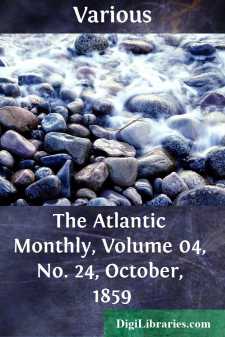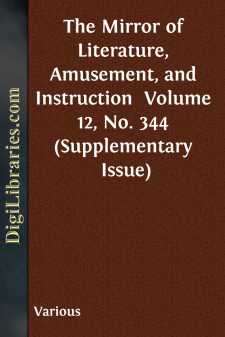Periodicals
- Art 27
- Children's periodicals 59
- Entertainment 5
- Food/Wine 2
- Games/Humor 455
- General 661
- Health 1
- History 53
- House/Home 1
- Regional 62
- Science/Nature 118
- Transportation 10
Periodicals Books
Sort by:
by:
Various
July 15th, 1914. Two men carrying bombs were arrested last week on the outskirts of Paris, and are suspected of a plot against the French President. They alleged that the bombs were made for the Tsar of Russia, but the Tsar denies that he gave the commission. The town of Criccieth, it is reported, has decided to give up gas in favour of electricity. This, of course, is not meant as a slight on its most...
more...
by:
Various
NOTES. ETYMOLOGY OF "WHITSUNTIDE" AND "MASS". Perhaps the following Note and Query on the much-disputed origin of the word Whitsunday, as used in our Liturgy, may find a place in your Journal. None of the etymologies of this word at present in vogue is at all satisfactory. They are— I. White Sunday: and this, either— 1. From the garments of white linen, in which those who were at...
more...
by:
Various
DAILY BEAUTY. Toward the end of a city morning, that is, about four o'clock in the afternoon, Stanford Grey, and his guest, Daniel Tomes, paused in an argument which had engaged them earnestly for more than half an hour. What they had talked about it concerns us not to know. We take them as we find them, each leaning back in his chair, confirmed in the opinion that he had maintained, convinced...
more...
by:
Various
MEN AND THINGS OF THE MOMENT. [Mr. Punch cannot hold himself responsible for the views expressed in the following correspondence.] The Mallaby-Deeley Emporium. Dear Mr. Punch,—I want you to use your influence with that great philanthropist, Mr. Mallaby-Deeley. I know that he is too modest to claim to be a benefactor of the race, but I am at least right in calling him "Mr.," for that is how he...
more...
by:
Various
THE COSMOPOLITE. THE TIMES NEWSPAPER. (Concluded from page 292.) Passing over the leading articles, and some news from the seat of war, next is the Court Circular, describing the mechanism of royal and noble etiquette in right courtly style. The "Money Market and City Intelligence"—what a line for the capitalist: only watch the intensity with which he devours every line of the oracle, as the...
more...
LETTERS TO ABSTRACTIONS. No. XVII.—TO FAILURE. A Philosopher has deigned to address to me a letter. "Sir," writes my venerable correspondent, "I have been reading your open letters to Abstractions with some interest. You will, however, perhaps permit me to observe that amongst those to whom you have written are not a few who have no right whatever to be numbered amongst Abstractions....
more...
by:
Various
FARCOT'S IMPROVED WOOLF COMPOUND ENGINE. In a preceding article, we have described a ventilator which is in use at the Decazeville coal mines, and which is capable of furnishing, per second, 20 cubic meters of air whose pressure must be able to vary between 30 and 80 millimeters. In order to actuate such an apparatus, it was necessary to have a motor that was possessed of great elasticity, and...
more...
by:
Various
The Keepsake. Edited by F.M. Reynolds, Esq. This is a magnificent affair, and is one of the proud triumphs of the union of Painting, Engraving, and Literature—to which we took occasion to allude in a recent number of THE MIRROR. Each department is unique, and the lists are like the Morning Post account of a drawing room, or Almack's—the princes of the arts, and the peers of the pen....
more...
by:
Various
THE SELECTOR,ANDLITERARY NOTICES OF NEW WORKS. CHRONICLES OF THE CANONGATE.(By the author of Waverley.)[We have the pleasure of submitting to our readers, (almost entire,) one of the stories of the forthcoming Chronicles of the Canongate, it being the second narrative, and the last in the first volume, and as well as the others, founded on true incidents. The Chronicles are domestic tales; but the Two...
more...
UNTILED; OR, THE MODERN ASMODEUS. "Très volontiers," repartit le démon. "Vous aimez les tableaux changeans: je veux vous contenter."Le Diable Boiteux. XVIII."'Mrs. Mæcenas!' So some would-be witDubbed the fair dame. The title may not fitWith accurate completeness;It soars some shades too high, this modishmot,As 'Mrs.Lyon-Hunter' sinks too low;Both nick-names...
more...











